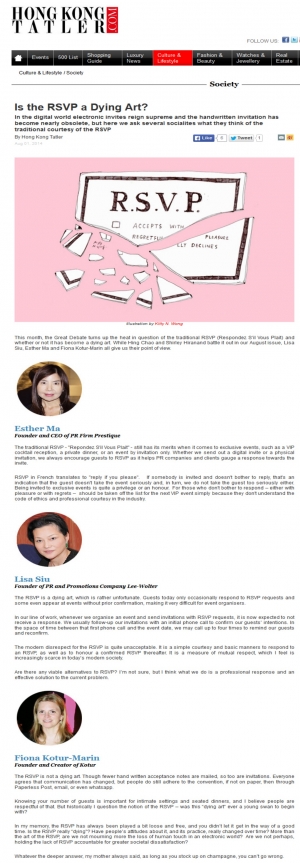In the digital world electronic invites reign supreme and the handwritten invitation has become nearly obsolete, but here we ask several socialites what they think of the traditional courtesy of the RSVP.
This month, the Great Debate turns up the heat in question of the traditional RSVP (Respondez S’il Vous Plait) and whether or not it has become a dying art. While Hing Chao and Shirley Hiranand battle it out in our August issue, Lisa Siu, Esther Ma and Fiona Kotur-Marin all give us their point of view.
Esther Ma
Founder and CEO of PR Firm Prestique
The traditional RSVP – “Repondez S’il Vous Plait” – still has its merits when it comes to exclusive events, such as a VIP cocktail reception, a private dinner, or an event by invitation only. Whether we send out a digital invite or a physical invitation, we always encourage guests to RSVP as it helps PR companies and clients gauge a response towards the invite.
RSVP in French translates to “reply if you please”. If somebody is invited and doesn’t bother to reply, that’s an indication that the guest doesn’t take the event seriously and, in turn, we do not take the guest too seriously either. Being invited to exclusive events is quite a privilege or an honour. For those who don’t bother to respond – either with pleasure or with regrets – should be taken off the list for the next VIP event simply because they don’t understand the code of ethics and professional courtesy in the industry.
Lisa Siu
Founder of PR and Promotions Company Lee-Wolter
The RSVP is a dying art, which is rather unfortunate. Guests today only occasionally respond to RSVP requests and some even appear at events without prior confirmation, making it very difficult for event organisers.
In our line of work, whenever we organise an event and send invitations with RSVP requests, it is now expected to not receive a response. We usually follow-up our invitations with an initial phone call to confirm our guests’ intentions. In the space of time between that first phone call and the event date, we may call up to four times to remind our guests and reconfirm.
The modern disrespect for the RSVP is quite unacceptable. It is a simple courtesy and basic manners to respond to an RSVP, as well as to honour a confirmed RSVP thereafter. It is a measure of mutual respect, which I feel is increasingly scarce in today’s modern society.
Are there any viable alternatives to RSVP? I’m not sure, but I think what we do is a professional response and an effective solution to the current problem.
Fiona Kotur-Marin
Founder and Creator of Kotur
The RSVP is not a dying art. Though fewer hand written acceptance notes are mailed, so too are invitations. Everyone agrees that communication has changed, but people do still adhere to the convention, if not on paper, then through Paperless Post, email, or even whatsapp.
Knowing your number of guests is important for intimate settings and seated dinners, and I believe people are respectful of that. But historically I question the notion of the RSVP – was this “dying art” ever a young swan to begin with?
In my memory, the RSVP has always been played a bit loose and free, and you didn’t let it get in the way of a good time. Is the RSVP really “dying”? Have people’s attitudes about it, and its practice, really changed over time? More than the art of the RSVP, are we not mourning more the loss of human touch in an electronic world? Are we not perhaps, holding the lack of RSVP accountable for greater societal dissatisfaction?
Whatever the deeper answer, my mother always said, as long as you stock up on champagne, you can’t go wrong.
